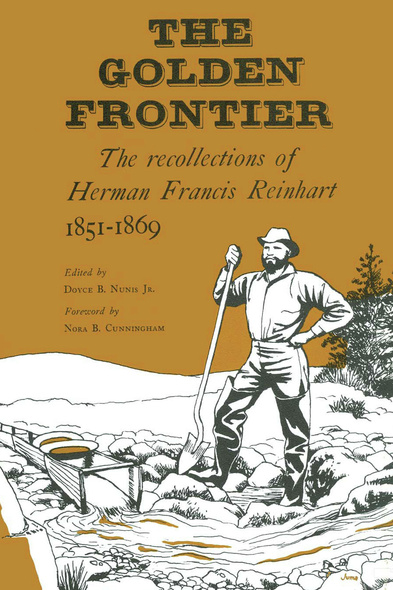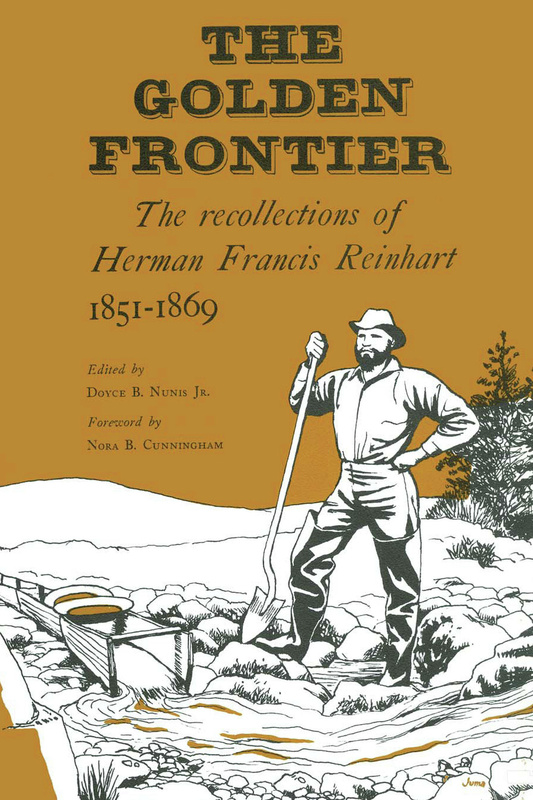The Golden Frontier
The Recollections of Herman Francis Reinhart, 1851-1869
The gold rush was Herman Francis Reinhart's life for almost twenty years. From the summer of 1851 when, as a boy in his late teens, he traveled the Oregon trail to California, until a January day in 1869 when he climbed aboard an eastbound train at Evanston, Wyoming, he was a part of every gold discovery that stirred the West.
Reinhart dipped his pan in the streams of northern California and western Oregon—in Humbug Creek, Indian Creek, Rogue River, and Sucker Creek. He made the arduous and dangerous overland journey through Indian-occupied western Washington and British Columbia to find the Fraser River gold even more elusive than that farther south. With his teams and wagons he traversed all of the inland mine areas from Walla Walla to Fort Benton, from Boise Basin to South Pass City.
Reinhart's German common sense soon turned him from actual mining to other sources of income, but whatever his labor was, the mines were always the focal point of his activities. When he operated a bakery and saloon it was a business whose customers were miners, whose transactions were more likely to involve gold dust than legal tender, and whose gambling tables saw the exchange of mining fortunes. When he operated a whipsaw mill the timbers cut there were used by miners for sluices and cradles. For a while Reinhart farmed, but planting and harvesting suffered from interruption by frequent expeditions to the mines. And when he prospered as a teamster it was to and from the mining towns that he hauled passengers, supplies, and equipment.
The men who, like Herman Francis Reinhart, hopefully followed the golden frontier were not an articulate group, and the written records of their lives are few and fragmentary. But Reinhart, in his later years, recorded his experiences in five long, narrow, hardback ledgers. Many years after he died his daughter gave the ledgers to a friend in Chanute, Kansas—Nora Cunningham—who read the narrative, became fascinated by it, and typed it for publication.
Reinhart's account, written in a grammar and language all his own, is not a record of the historian's West, but of the West of the individual miner. The pages are filled with the details of day-to-day life of the miners—the subjects that interested them, the problems that plagued them, their fun and feuding, their frustrations and hopes. Edited by an authority of the history of the West, it is a book that will offer exciting reading to casual readers and scholars alike.
I know of no other account of that time and region which furnishes glimpses of so many major events.
- Foreword
- Acknowledgments
- Prologue
- Chapter 1. Overland to California
- Chapter 2. Mining Apprenticeship: Siskiyou County
- Chapter 3. Gold Rush Days in Southern Oregon
- Chapter 4. A Pacific Rancher on the Oregon Coast
- Chapter 5. Return to Siskiyou: Indian Wars and Mining
- Chapter 6. To the Fraser and Return
- Chapter 7. Oregon Interlude
- Chapter 8. People, Places, and Things
- Chapter 9. Winter in Walla Walla
- Chapter 10. Settling Down on Dry Creek
- Chapter 11. Hauling to the Boise Basin
- Chapter 12. Badmen, Gunmen, and Vigilantes
- Chapter 13. Teamster in Montana
- Chapter 14. Utah: Mormons and Lost Horses
- Chapter 15. Hauling for the Union Pacific
- Epilogue
- Appendix
- Bibliography
- Index





